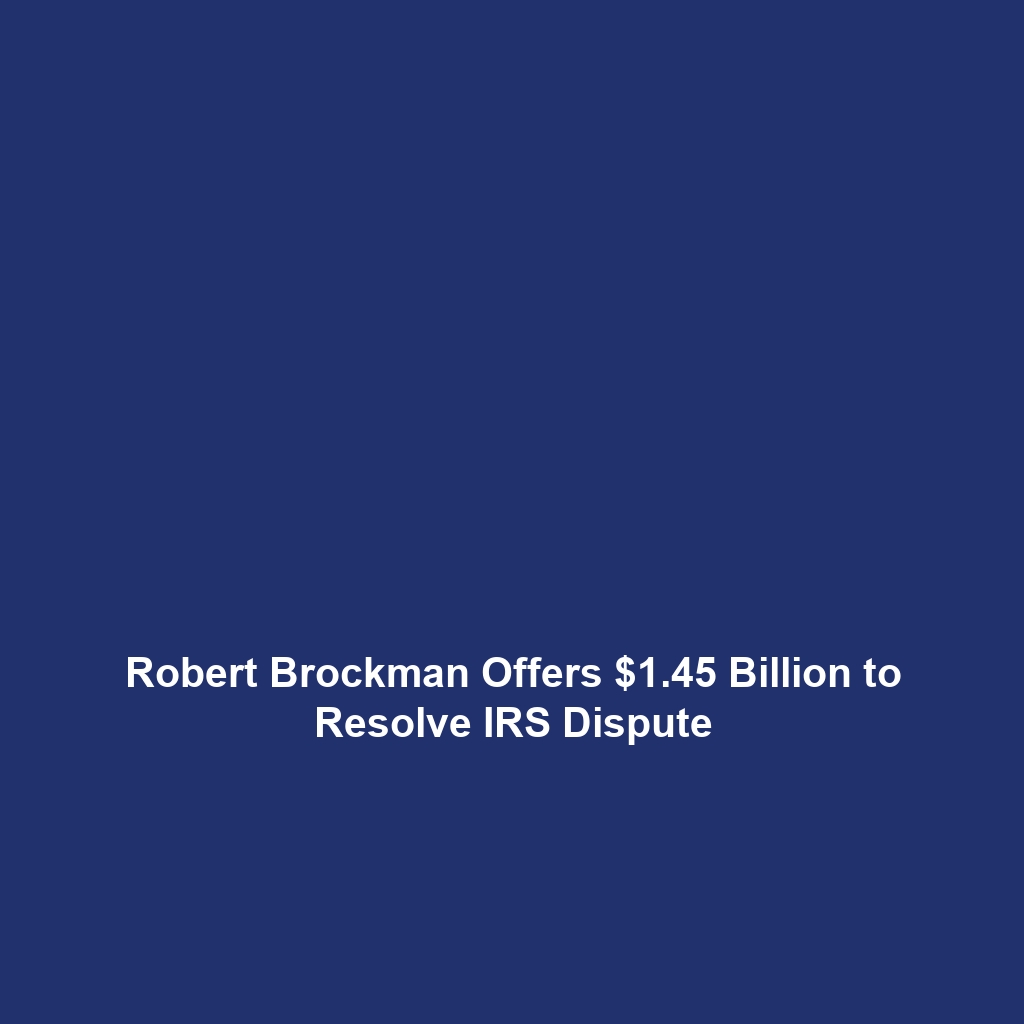Your cart is currently empty!
Tag: tax attorney

Robert Brockman Offers $1.45 Billion to Resolve IRS Dispute
Robert Brockman Offers $1.45 Billion to Resolve IRS Dispute
Robert Brockman Offers $1.45 Billion to Resolve IRS Dispute
Billionaire businessman Robert Brockman has proposed a $1.45 billion settlement to address ongoing tax disputes with the Internal Revenue Service (IRS). This offer comes amid serious allegations of tax fraud and evasion, which have been a focal point of a legal battle that has garnered significant media attention.
Background of the Case
Robert Brockman, who made his fortune in software and technology industries, faces multiple criminal charges alleging that he concealed more than $2 billion in income from the IRS over the years. The charges, filed in 2020, include tax evasion, wire fraud, and other serious offenses related to a complex scheme that allegedly involved offshore accounts.
The case has been complicated by Brockman’s legal strategy and claims of declining health, as he has sought to delay proceedings citing medical issues. His legal team has consistently argued against the government’s claims, asserting that the accusations lack substantive evidence.
Details of the Settlement Proposal
Brockman’s recent offer to settle the disputes stems from an effort to resolve IRS liens placed on his assets as the litigation continues. The proposal, if accepted, would amount to one of the largest settlement offers made in the history of disputes involving the IRS.
According to sources close to the negotiations, the settlement would allow Brockman to pay off the liens and avoid further penalties while also enabling the IRS to recoup a substantial portion of the alleged tax liabilities. This could potentially lead to a quicker resolution of the case, sparing both parties from a prolonged court battle.
Implications of the Settlement
If the IRS accepts the $1.45 billion offer, it may signal a shift in how the agency approaches large-scale tax fraud cases, emphasizing settlement over drawn-out litigation. Legal experts suggest that a successful resolution could pave the way for more settlements in similar high-profile cases.
“Settlements can benefit both parties,” said tax attorney and expert Robert L. Cohen. “For Brockman, it provides him with a way to move forward and potentially restore his reputation, while for the IRS, it ensures they recover funds without the uncertainty of a trial.”
Reactions to the Proposal
The proposal has received mixed reactions from the public and legal analysts. Supporters of Brockman argue that he deserves a chance to resolve his issues without the additional burden of a protracted trial, while others criticize the significant amount he is willing to pay as just a fraction of what he allegedly owes.
“This proposal could be seen as an admission of guilt, but it may also be a pragmatic step for both sides,” commented legal analyst Jennifer H. Roberts. “The complexities of tax law and litigation can be daunting, and this might be the best way to achieve a resolution.”
Next Steps in the Legal Proceedings
The IRS has yet to respond formally to Brockman’s settlement offer. The agency typically takes time to consider such proposals, weighing the implications of accepting or rejecting an offer of this magnitude. Depending on their response, a timeline for resolution may be established, although significant delays could still occur as legal reviews are conducted.
As the case continues to unfold, many are watching closely to see how it may influence future settlements in other high-value tax disputes. With public interest high and the stakes at play, the outcome of this case could have wider ramifications for billionaires facing similar legal challenges.
Conclusion
Robert Brockman’s $1.45 billion proposal to settle his IRS disputes represents a significant development in his ongoing legal battle over tax fraud allegations. While it remains uncertain whether the IRS will accept the offer, this case highlights the complexities and potential resolutions inherent in high-stakes tax litigation.
As both parties navigate this crucial juncture, the resolution of Brockman’s case could have lasting implications beyond his personal circumstances, potentially influencing the broader landscape of tax enforcement policy and public perception of wealthy individuals facing similar allegations.